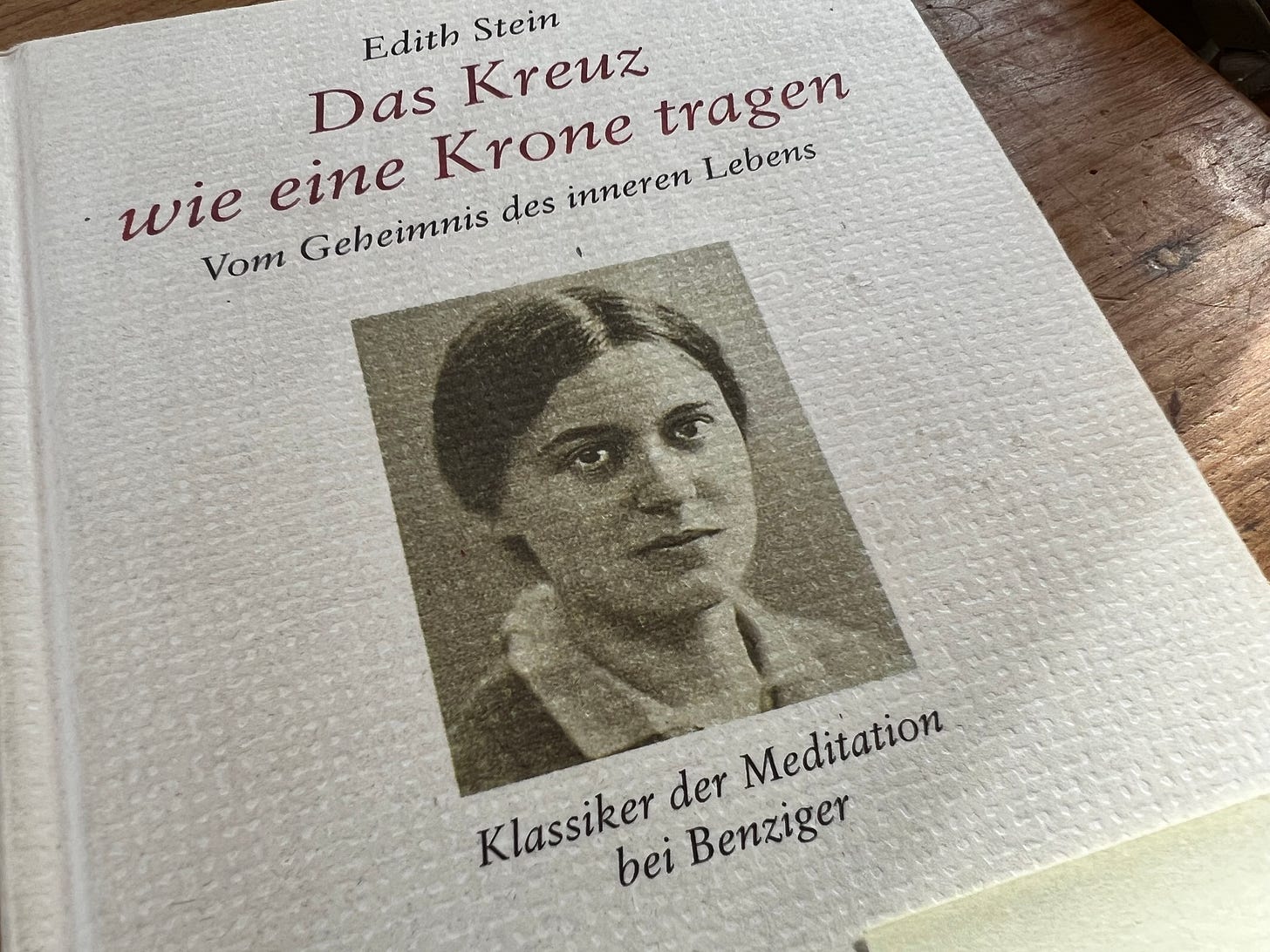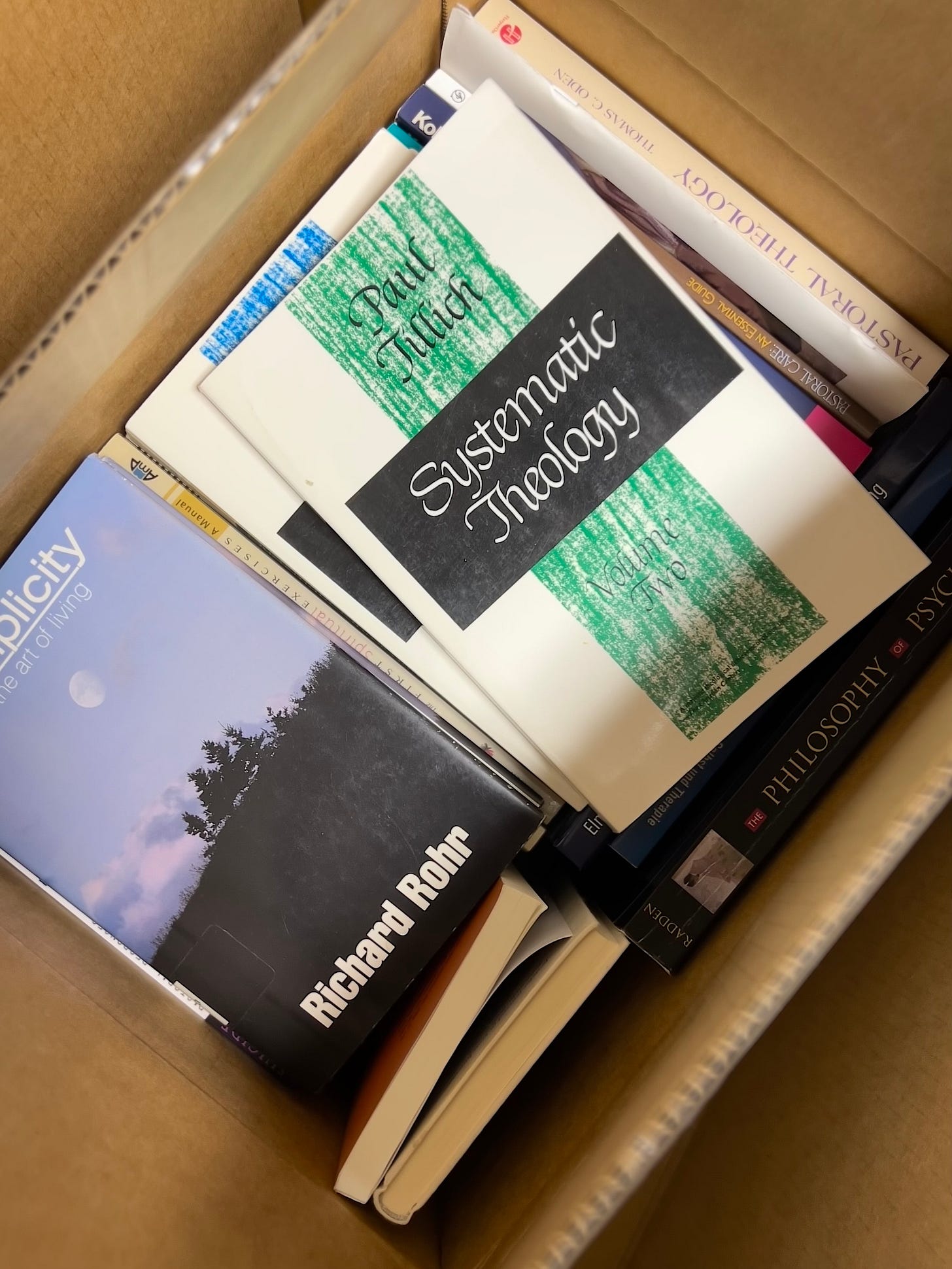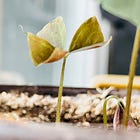Embracing messiness (and grace).
Why I descended in our messy basement to find inspiration — and how I emerged with a book by the German mystic Edith Stein.
Dear fellow pilgrim,
You might have noticed that I have been a few weeks away as we hit the road for a last Hurrah this summer before our little one would become a kindergartener (and she did just this week!).
And though I only took August off from writing it feels like a whole year, no decades, have happened in-between.
Where shall I even start?
And that, dear fellow pilgrim, is exactly the problem. I am trying now for more than a week to get back to writing and it seems that I just can’t find a beginning.
, a great writer’s consultant with whom we are working to launch our joint book project just suggested to embrace the messiness of the process. You mean to just write about me figuring out what to write about? Apparently, that is just what he meant.So well, here is the story about why I was descending into our basement this afternoon to find a book for you, and for me, to write this (mid)weekly blessing to you today. If you are not up to join me on this downward descent you can just scroll below to find the resulting final wisdom gained from it, and miss out on how we got there :-)
At the onset of the pandemic we moved into another home. Since then boxes of books have cluttered our basement and have lain there lethargically, refusing to ascend the stairs.
When I was biting my nails and walked in circles trying to get back to writing anything meaningful which could resemble a Cloister note (which means a note from my interior space to your’s) it became clear, I had to descend into the exterior mess of our basement first. May be grabbing a random book from a random box could solve two things at once? Get me interested in those books downstairs again (with the hope attached to give them a proper home upstairs) but also to give me the inspiration needed to get back to writing.
So I descended into the belly of the unfinished basement of our 124 year old house to see what I could see.
And while the depth psychologist already sees a lot in my process of simply descending down into the realm of unconsciousness, or in this case the realm of my forgotten books in our cluttered basement, all I could see after finding the light switch were shelves filled with dusty boxes and a lonely mouse trap beneath them.
Where should I start? I took some courage and ventured deeper all the way into the second storage room where I promptly found an open box. Albert Camus, was written on the first cover, a book I always wanted to read and never did. I put it right back. The next one was by Rollo May, the American humanist psychologist I have studied quite in-depth. He was a student of Paul Tillich who was a student of Søren Kierkegaard, who is the Danish so-called “father of Existentialism” about whom I wrote my dissertation (if you are interested I also wrote on this intellectual heritage of influence in an article on Irvin Yalom’s Existential Psychotherapy here).
I skimmed through the pages and stopped at a quote by Nietzsche on being.
Shall I or shall I not?
I put it back, too.
By now I was aware I was breaking my own rule of grabbing the first book and running with it.
I gave it a third and last try, just like our 5-year-old would. Maybe another shelf in the other room?
May be something I actually read and marked as important?
By now, I already had several books in my basket. I added some random books from another box on the way about how to start a successful consulting business, a cook book and some children’s books.
Okay, the third and last try. I heaved a box labeled “religious and upbuilding” from the second shelf and let it fall to the ground. Surely the label was promising. I have always thought religious stuff only makes sense if it is also upbuilding.
Which brings me back to Nietzsche, another fellow Protestant-German-Preacher’s-Kid who ended up a philosopher. His critique of Christianity was that it appeared too burdensome and rigid and stiff. “Erlöster müssten see aussehen, die Christen…” (They should look more saved, those Christians…) he wrote somewhere, and I had to give him this point.
When the lid rose from the third and last box some of my favorites appeared: Tillich’s Systematic Theology and Richard’s Rohr The Art of Living. Without touching to not break my rule I peaked a bit deeper into the box just in case. Then I saw it! Did I grab it or did it grab me?
Edith Stein: On the mystery of the interior life
How could a little book by the German mystic Edith Stein, a Jewish woman turned Catholic nun murdered by the Nazis, be upbuilding?
Let’s see.
The first scroll brought me right to a page with a strongly underlined paragraph, titled: “Ergreifen und Ergriffen werden.” A beautiful German world play which does not read as well in English: Grasping and being grasped. Or moving and being moved. Or taking and being taken. Or holding and being held. Somewhere in-between all these.
It is a phrase which marks the beautiful existential dialectic of the inner life when we move towards the eternal only to then be moved by it. It has always captured my attention, and it immediately pulled me deep into remembered reflection.
Edith Stein then continued to unfold what this means in the context of faith:
“Der Glaube ist ein Ergreifen Gottes. Das Ergreifen aber setzt ein Ergriffenwerden voraus: wir können nicht glauben ohne Gnade.
Und Gnade is Anteil am göttlichen Leben.”Faith is grasping for God. And this grasping requires being grasped: We cannot have faith without grace.
And grace is taking part in the Divine life.1
So, my little journey to descend and embrace the messiness of my creative life in our basement brought me to one of the most significant women writers of modern times, one who died a martyr.
And today, in this “messed-up” midweek blessing she invites me - us - into grace.
Into not only moving towards a goal, even if it is faith, but to let ourselves being moved instead.
Isn’t it humbling to see how we forget what we already know because we are too busy with other things? How often do we push grace back into the basement of our heart, while we fuss with all the other important things that clamor for our attention?
Sometimes we must descend into the messiness of our life, into the unopened, dusty boxes, to find what we have always known in our hearts:
Grace waits for us. Even now.
Even on a day like this. In a world like this. Where school kids are murdered senselessly. Where wars rage and where division seems to rule.
Grace waits at the bottom of our heart’s staircase, where the eternal wants to dwell.
Grace, be welcome here.
May it be so and may grace abound within you, Almut (with Chuck and little one)
PS: If you can, leave a heart, a word or a line which resonated with you in the comments, so we know you have been here :-)
Thank you for reading, sharing and supporting Cloister Notes, a letter for dancing monks, weary pilgrims and wounded healers in the intersection of psychology, philosophy and spirituality. Your support makes this labor of love possible.
If you do not want to receive further (mid)weekly blessings you can manage your subscription here.
About Almut
Almut Furchert, Dr. phil., Dipl. Psych. is a German American scholar and practitioner, a psychologist turned philosopher turned writer, traveler, photographer, retreat leader and mother of a kindergartener. She has taught and published on authors like Kierkegaard, Buber, Frankl, Yalom, Edith Stein, and Hildegard of Bingen. Almut is also a Benedictine Oblate and lives with her family in a little college town in MN.
In case you missed it
My translation from Endliches und Ewiges Sein. 1950, p. 56.











As I was reading (and imagining my own boxes of books), my first thought was, "Draw nigh unto Me and I'll draw nigh unto you." I think in pictures (and thought everyone did) and I always picture myself walking towards God and being pulled by God simultaneously.
Glad to read your beautiful reflection-going down or into the messy heart of things. And to be encouraged by the rediscovery of grace. You lifted me.